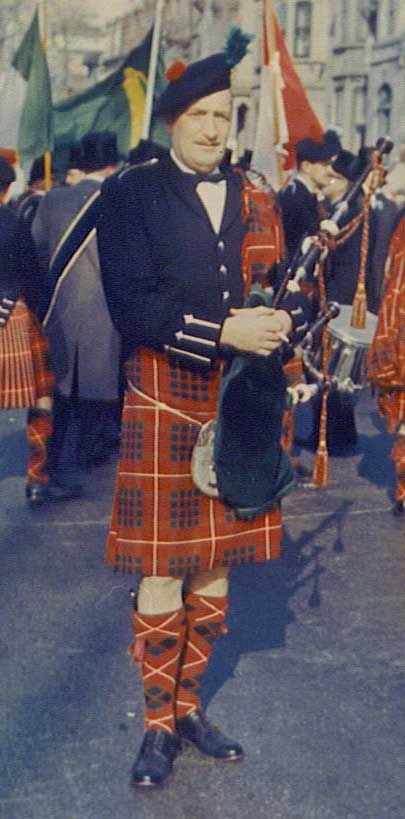|
-
20th April 10, 11:29 PM
#11
George Grant (1920-1965)
Born in Dumfries, Scotland, on March 21, 1920, Pipe Major George Darroch Grant was raised with an uncle in the Highlands, and started pipes with his grandfather. He joined the Scots Guards when he was 17 and served during the war in the North African campaign and elsewhere.
He took the Pipe Major’s course from Willie Ross at the Castle, and served as Pipe Major of the Second Battalion of the Scots Guards for five months, from November, 1945 until March, 1946. Thereafter he spent seven years in the Edinburgh Police before emigrating to Montreal, where he joined the R.C.A.F. security police. He also became a member of the Rockcliffe R.C.A.F. Pipe Band, where he played with the likes of John T. MacKenzie and drummer Jim Blackley.
During his later years George Grant became extremely active in the Montreal piping scene. He was charming and well liked, and a huge supporter of all things Celtic. He organized dances, concerts, recitals and piping classes as well as serving as Pipe Major of the City of Montreal Pipe Band. As a composer, he excelled at writing jigs, and his “Wee Marie” and “Marjorie Lowe” are two of the finest in the idiom.
He was a prize-winning professional competitor in Ontario and Quebec, and his name graced all the major trophies at Maxville until they were destroyed in a fire.
On September 4, 1965, he had just finished playing in the professional events at the games in Schenectady, NY and was preparing to set up the City of Montreal band for the afternoon’s competition when he was stricken with a heart attack and collapsed. Though well enough to express his regrets at not being able to play a lament for his recently deceased friend George Duncan, he later fell into a coma and passed away two weeks later. He was 45.
His funeral service took place on October 9 in the R.C.A.F. Chapel in St. Hubert, and he was buried in Mount Royal Cemetery.
George Grant, in the kilt of the City of Montreal Pipe Band, in 1964.

http://www.pipetunes.ca/composers.as...&composerID=53
[SIZE="2"][FONT="Georgia"][COLOR="DarkGreen"][B][I]T. E. ("TERRY") HOLMES[/I][/B][/COLOR][/FONT][/SIZE]
[SIZE="1"][FONT="Georgia"][COLOR="DarkGreen"][B][I]proud descendant of the McReynolds/MacRanalds of Ulster & Keppoch, Somerled & Robert the Bruce.[/SIZE]
[SIZE="1"]"Ah, here comes the Bold Highlander. No @rse in his breeks but too proud to tug his forelock..." Rob Roy (1995)[/I][/B][/COLOR][/FONT][/SIZE]
-
Similar Threads
-
By Big Paul in forum How to Accessorize your Kilt
Replies: 11
Last Post: 3rd October 07, 06:21 PM
-
By angerli in forum General Kilt Talk
Replies: 17
Last Post: 1st February 07, 02:13 PM
-
By cessna152towser in forum Show us your pics
Replies: 3
Last Post: 22nd May 06, 05:25 PM
Tags for this Thread
 Posting Permissions
Posting Permissions
- You may not post new threads
- You may not post replies
- You may not post attachments
- You may not edit your posts
-
Forum Rules
|
|
















Bookmarks